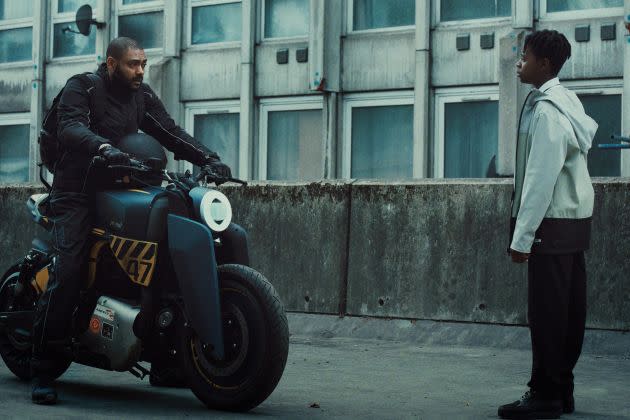‘The Kitchen’ Review: Kibwe Tavares And Daniel Kaluuya’s Urban Sci-Fi Finds An Emotional Arc In A Grim Vision Of The Future – London Film Festival


There’s a soaring ambition but only a modest intent in Kibwe Tavares and Daniel Kaluuya’s sober debut The Kitchen, a visually impressive depiction of things to come that simmers with all manner of protest but never hits boiling point. On the one hand, it’s a shame, ending on a quiet moment of understanding just as all hell is about to break loose. But on the other, it’s refreshing to see two young filmmakers trying to hone their storytelling skills rather than pour everything into a spectacular calling card. If Attack the Block hadn’t been so slavish in trying to siphon inspiration from much better cult movies to become a cult movie in its own right, it might have looked like this: a genuine vision of a nightmarish, dystopian future that will ring alarm bells for any city-dweller familiar with the depressing effects of gentrification.
The Kitchen is a sink estate somewhere in London. But although it is most likely inspired by the nefarious goings-on in the city’s Elephant & Castle, where redevelopers promised social housing to its displaced residents and then turfed them out on their ears, the landscape is eerily unplaceable, thanks to a surfeit of skyscrapers and other landmarks that blurrily clutter up the horizon (might that be the London Eye in the background, one of Wembley’s arches, or neither?). It’s a smart move that will strike a chord in other cities, evoking every urban backwater from the banlieues of Paris to the favelas of Rio.
More from Deadline
The Kitchen sets out its stall with two interlinked stories. The first sees Isaac (Kane Robinson), aka Izi, taking his morning shower in the area’s shared facilities, in direct contravention of a strict edict that says water supplies must be rationed. As furious residents queue up, Izi takes his own sweet time, believing that his stretch in the estate is coming to an end — he will soon be moving out, and into a (comparatively) luxurious single-occupancy apartment in the upmarket Buena Vida compound. Meanwhile, masked robbers on motorbikes are carrying out a daring raid on a supermarket delivery van, telling the terrified driver, “It ain’t personal. We want this, not you.” When the job is done, the thieves drive the van into the Kitchen and distribute the spoils to a hungry crowd.
Izi so wants out of the Kitchen, he has detached himself emotionally for quite some time, working diligently at the Life After Life funeral home, where the ashes of the dead are mingled with seeds (presumably to save space as much as the environment). At the funeral of an ex-girlfriend, Izi is accosted by the woman’s young son Benji (Jedaiah Bannerman), who quizzes him about the Kitchen. “Is it really like what they say it’s like?” he asks. “A shithole?” Izi replies, in a tone of voice that says, yes, it is.
With his mother gone, Benji has nowhere to live, so he turns to the Kitchen, which, at various times resembles a post-apocalyptic Peckham Market that sometimes teems with just a hint of The Matrix Reloaded’s infamous rave scene. He falls in with a rough crowd — the street pirates we saw in the opening, who pelt police drone cameras with slingshots — but continues to pursue Izi, in the belief that he might be his missing father. Izi stonewalls all his questions. “This is the real world,” he says, “where no one cares. You’re on your own. Get used to it.” All the while, police SWAT teams raid the estate, trying to break up the community and break down their morale.
If that sounds bleak, it is rather bleak, always taking the tone down a notch after the film’s kinetic scenes of dancing and daredevil motorcycle stunts. This tortured hangout vibe is a steady theme, and the film’s earnestness might be a turnoff for anyone expecting an inner-city Fury Road. But, in some ways, the film’s seriousness is an interesting counterpoint to the VFX bells and whistles, using sci-fi tropes to reflect on the dystopia of modern-day life as it already is.
Key to the atmosphere is Lord Kitchener, of pirate station Kitchen Radio; played by footballer Ian Wright, himself an excellent funk DJ, Lord Kitchener is the conscience of the Kitchen (a device perhaps borrowed from Walter Hill’s The Warriors). Indeed, music plays a large part throughout, using different genres to reflect the social rather than racial mix of the Kitchen and culminating in the extended use of “How Great Thou Art,” a gospel song made internationally famous by Elvis Presley.
The father-son story brings an unexpectedly emotional arc, although, by the end, it does begin to grate, despite the infectious appeal of newcomer Bannerman as the inquisitive and persistent Benji. But there’s plenty of meat in its surrounding context, notably in the exhausting resistance being put up by a beleaguered community towards a faceless authority that wants to see it gone, out of sight and out of mind. As one of the rebels says quietly to Benji, “All we’re saying is no.”
Title: The Kitchen
Festival: London Film Festival (Closing Night)
Distributor: Netflix
Directors: Kibwe Tavares and Daniel Kaluuya
Screenwriters: Daniel Kaluuya, Joe Murtagh
Cast: Kane Robinson, Jedaiah Bannerman, Hope Ikpoku Jr, Ian Wright, Teija Kabs, Cristale, BackRoad Gee
Running time: 1 hr 38 min
Best of Deadline
SAG-AFTRA Interim Agreements: Full List Of Movies And TV Series
2024 Presidential Election Debate Schedule: Dates, Times, Who'll Be There And Who Won't
2023 Premiere Dates For New & Returning Series On Broadcast, Cable & Streaming
Sign up for Deadline's Newsletter. For the latest news, follow us on Facebook, Twitter, and Instagram.

 Yahoo News
Yahoo News 